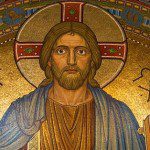One thing I noticed as a child, as I was trundled back and forth across the world, seemingly from one end to another, going into the comfortable living rooms of anxious mission-minded Americans and then back across the continent to the more spare living rooms of missionaries, and finally into the dusty courtyards of our village—though, I should say, I wasn’t so clever as to notice it on my own, it was pointed out to me—is that everyone feels poor.
Whether you are sitting back in luxurious cushions, some clear sparkling pool water at your feet, or whether your feet are red from an accumulation of dirt at the end of the day, you might be inclined to enumerate the lack that besets you. One of the jobs of the Christian is to listen to other people in their poverty, to share the abundance of God’s mercy, no matter who those people are or what you think about them. But sometimes whenever you feel poor, or you are anxious about someone who really is poor, you might feel short-tempered or even bitter. The family joke, which we would say to ourselves to get perspective, which is what this morning’s parable is really all about, was, in sundry variations, “I better not be having my reward now.”
Because, truly, Jesus throughout chapter 16 of Luke’s gospel is inviting his listeners, though whether they are really hearing is another matter, to think in economic terms about something most of us imagine has nothing to do with profits and loses, with rewards or money. What is that something? It’s our, to use a modern word, “spirituality.” Indeed, this very morning I came across this astute tweet, in the hashtag Sunday thoughts section,
Note to Self
Nobody is worth stressing over. Move on. It’s ok to leave people behind. Go find yourself. The world is yours. Life goes on.
There’s a picture of a young person with a backpack and a walking stick, setting off into the far country, and all the commenting tweets are of hearts, flowers, and praying hands.
Such was the rich man we might fairly notice—though today his trousers would be carefully ripped and cost from 500 to 1000 dollars—who was “clothed in purple and fine linen and who feasted sumptuously every day.” That’s all we know about him. He doesn’t get to have a name, though later he came to be known as “Dives” which means “Rich.” Certainly he had a name in his life, as he arranged himself day after day at his sumptuous table, Amazon boxes piled up in his recycling bin in the alley, going in and out of his front door in his purple and fine linen. We don’t find out anything about his friends, though later we know that he has family who must be in the same life situation as he is, for he is anxious that they will suffer his own fate. “Life” sure does “go on” until it very much doesn’t. The world was only barely metaphorically his. Tragically, for certainly twitter would tweet for several hours, and I would imagine that the funeral would be live-streamed, he dies, and so does the poor beggar at his gate.
Which is one of the wretched refrains of the Bible—that everyone dies no matter who they are. The rich die and leave all their stuff behind. The poor die also and their meager belongings are picked over by the other poor. In this everyone is equal, there is no difference between one kind of person and another, they all go down to the grave one by one by one.
Lazarus, strangely, does have a name, though the rich man doesn’t know it, and probably neither does anybody else. He has singularly failed by all measures of human society. He hasn’t washed his face. He isn’t having his best life now. He hasn’t completed that associates degree so he could at least work in medical billing. He never paid his rent. He couldn’t show up to the cruddy job he did have. Then he got sick. And so he sits in such a way that he can see into the rich man’s dining room and wish that he could just have some of the abundance that falls from that overladen table. A great insuperable chasm, or so it seems, is fixed between him and all that comfort. The dogs come and lick his sores, and he probably hears the rich man and his friends complaining about all the bad things that are happening to them.
So, as I said, they both die, and as in life, so in death, the two never meet to become friends, they never commiserate over all their troubles, they just each go to their separate places. Lazarus is finally and fully consoled. The rich man goes to a place of “torment.”
Curiously enough, the place of torment is not the least bit enlightening. The rich man is no more clever in hell than he was on earth. He still essentially discounts the existence of Lazarus, though perhaps elevating him from ‘nothing’ to ‘servant.’ He wishes Lazarus could bring him a drink, and then, finding that impossible, he wishes he would go back to the place of his torment to warn the rich man’s brothers.
Just as before, where Lazarus could see the abundance of rich food, now the rich man can see Lazarus’ consolation, and there is a great insuperable chasm fixed so that one cannot cross over to the other. The rich man is meant to see that the chasm before wasn’t really a chasm. He could have gone outside his gate and fed Lazarus with something, anything, but he didn’t, for all those reasons that pile up before us in our poverty.
I once heard a preacher explain that the rich are really going to Hell, and the poor are not, which very much misses the point. Consider first the name of the poor man—Lazarus. It means “God has helped,” which is very nice given the passive construction of the first part of the text. A rich man “was clothed,” and at his gate a poor man “was laid.” Second, Abraham reminded the rich man that his brothers had “Moses and the Prophets,” which you can hear this morning also, in church. Here is the prophet Amos,
Woe to those who lie on beds of ivory and stretch themselves out on their couches, and eat lambs from the flock and calves from the midst of the stall, who sing idle songs to the sound of the harp and like David invent for themselves instruments of music, who drink wine in bowls and anoint themselves sigh the finest oils but are not grieved over the ruin of Joseph!
The question isn’t money per-say, though certainly it does figure in. Lots of people in the Old Testament had money and we can all expect to see them in the bosom of Abraham, even David, who is ever so gently judged here with his inventions of music. He was rich, though, perversely, felt poor and so took someone who didn’t belong to him, who participated in the “ruin of Joseph” as we all do, we can’t help it. No matter how much money you have or don’t have, the little you have you are bound to mismanage, to use wrongly. In your poverty you will take your riches and spend them on your own consolation.
The question is your grief. And then, in your grief, your helplessness. Abraham himself, though he had wealth that the modern world can only dream of, lacked one thing, a son, that he could not provide for himself. And, though he ruined the life of another (Hagar) in his grief he cried out to his God and stood helpless before him. And there he found a consolation that encompasses everyone who looks at whatever poverty they have and sees that the insuperable chasm that apparently could never be breached really was, by the very one who rose from the dead.
When you look up from your own private place of torment in this life, and I’m sure we all have one, the choice is to see, in your grief, that there is a way out, there is a perfect consolation, a resurrection, a life, Person. And the curious thing about that Person is that he will open your eyes to see all the people around you, that you don’t really get to, nor want to “leave people behind,” as our Sunday Thoughts tweeter advised. Life here doesn’t go on, but it does go on there, forever. You can taste more than a crumb of it if you go to church this morning. For there the richest of all, who is chiefly overflowing with mercy, feeds you with himself.












